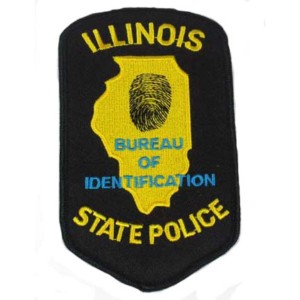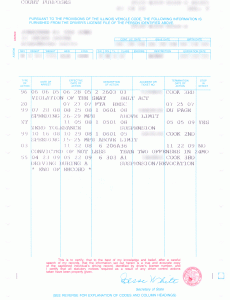
An arrest for driving under the influence in Illinois is recorded, in most respects, for all time. This is a distressing fact for someone who has never been arrested before. One bad decision can make for a lifetime of regret.
But it does not have to be that way.
The record of a DUI arrest does not have to haunt a person for life. While it may be difficult to clear the record of a drunk driving arrest, it is possible. But to clear a record of DUI, it is first necessary to understand what the record is, where it is, and how it got there.
The record begins with a statutory summary suspension.
On arrest, the motorist is served with a notice of summary suspension (which appears on paper as, “NOTICE OF SUMMARY SUSPENSION/REVOCATION”). Summary suspension is the term that describes the loss of driving privileges for refusing a breathalyzer, or blowing over the legal limit (0.08).
On the bottom of the notice, in red, capital letters are the following words: “POLICE OFFICER – GIVE TO MOTORIST.” The copy that is provided to the driver is a carbon copy. Another carbon copy is mailed to the Secretary of State in Springfield. That copy says, “POLICE OFFICER – SEND TO SECRETARY OF STATE.” When it is received, the Secretary of State then suspends that person’s license after 45 days have passed.
 The Secretary’s action against the driver’s license is recorded on that person’s driving record. Illinois driver’s records are called abstracts. At the present time, they cost $12, and can be purchased at almost any Secretary of State facility.
The Secretary’s action against the driver’s license is recorded on that person’s driving record. Illinois driver’s records are called abstracts. At the present time, they cost $12, and can be purchased at almost any Secretary of State facility.
The record of an arrest for driving under the influence on a driver’s abstract has two parts: the summary suspension and the misdemeanor offense. The two are not related. A person can be arrested for DUI and not get suspended, such as where he blows under 0.08 on the breathalyzer. DUIs based on 0.079 breath tests happen from time to time.
Or a person can be suspended for a 0.08 breathalyzer yet win the case at trial. In this instance, the driver’s abstract would show a summary suspension but no DUI.
The statutory summary suspension will appear on the arrestee’s driving record permanently. Each driver in Illinois has a court purposes abstract which shows information such as this to court personnel such as law enforcement officers, prosecutors, defense attorneys, and judges.
While some supervisions for moving violations are removed administratively by the Secretary of State after four years, a summary suspension is not removed. It never disappears from an abstract. This is a permanent record.
That being said, court purposes abstracts generally are not available to anyone but court personnel and the driver himself. It is not a public record.
The second part of a DUI record relates to the Illinois State Police. Regardless of which police department the officer who arrested the driver was from, the State Police are a party to every arrest for driving under the influence in Illinois.
The law says that every law enforcement agency in the state is required to report arrests to the State Police. The Illinois State Police are the record keepers for all criminal charges filed in the state–everything from DUI to 1st degree murder. These records are maintained pursuant to the Criminal Identification Act, 20 ILCS 2630/1.
The State Police organization has a department called the Bureau of Identification. The department is located on Chicago street in downtown Joliet, to the southwest of Chicago.
The Bureau maintains computer records on every person who has been arrested for a crime in Illinois. This information is disseminated nationwide.
Each person who is arrested has, in fact, a criminal record before he or she ever steps foot inside a courthouse. Regardless of the presumption of innocence, a person who is arrested in Illinois gets a criminal record.
The process begins with a booking photo and fingerprinting, and recording of demographic data (gender, race, identifiable scars, tattoos, or marks, etc). The police officer who does the booking will provide the arrestee’s profile to the State Police. Some departments use old-fashioned ink to print the suspect, while others are equipped with new technology that sends the information over the internet without using ink. This is called Live Scan technology. For police departments with Live Scan technology, the criminal record is generated instantaneously.
The statute that requires the local law enforcement agency to transmit arrest records is 20 ILCS 2630/5(a). It provides the following:
All policing bodies of this State shall furnish to the Department, daily, in the form and detail the Department requires, fingerprints and descriptions of all persons who are arrested on charges of violating any penal statute of this State for offenses that are classified as felonies and Class A or B misdemeanors and of all minors of the age of 10 and over who have been arrested for an offense which would be a felony if committed by an adult, and may forward such fingerprints and descriptions for minors arrested for Class A or B misdemeanors. Moving or nonmoving traffic violations under the Illinois Vehicle Code shall not be reported except for violations of Chapter 4, Section 11-204.1, or Section 11-501 of that Code.
See id.
The statute says that moving violations under the vehicle code are not supposed to be reported However, violations of 625 ILCS 5/11-501, the DUI statute, must be reported.
This record has the potential to be permanent. But it does not have to be.
The law provides for expunging the record. Expungement happens when the police department that made the arrest, the prosecutor, State Police, and court all destroy the records of the arrest and criminal charge(s). Technically, the court does not destroy the record, but it does obliterate the person’s name from the index and place the court file under seal (so that it is non-public).
The expungement process is made possible by the very same law that mandates reporting these arrests to the State Police: the Criminal Identification Act.
Section 2630/5.2 allows someone who was arrested and charged with DUI to have the record expunged. But, expungement may occur only under certain conditions: the charges were dismissed or the defendant was found not guilty.
Illinois law does not allow for a DUI to be expunged under any other circumstances. The only other charges treated this way are felonies. Neither supervisions nor convictions for driving under the influence can be expunged.
And so, the takeaway from this article is this: find a lawyer who gives you the best possible chance of getting the charges dismissed or a not guilty verdict.

